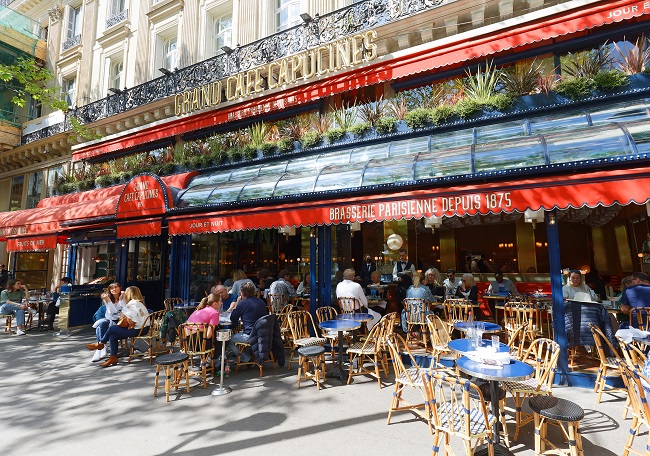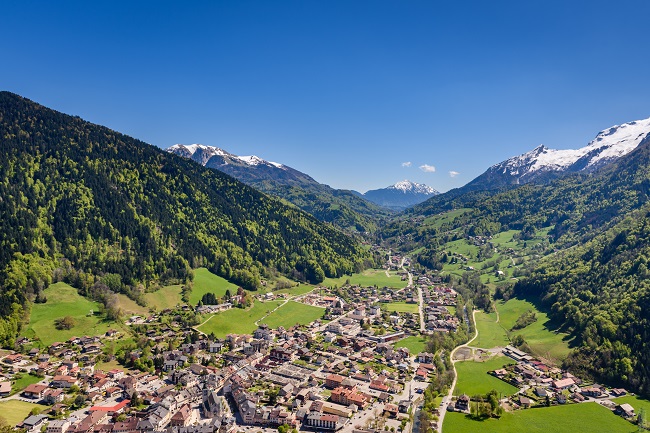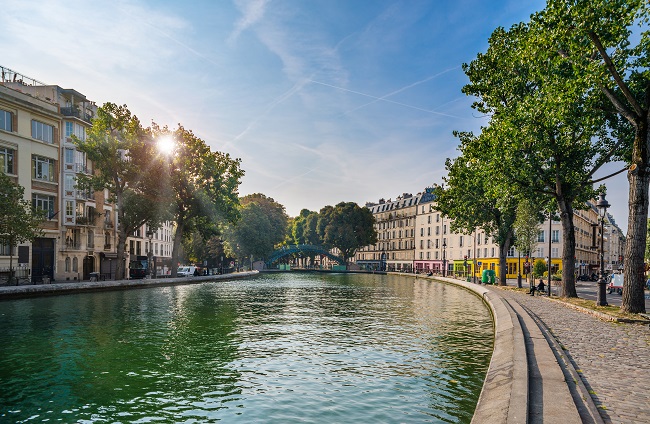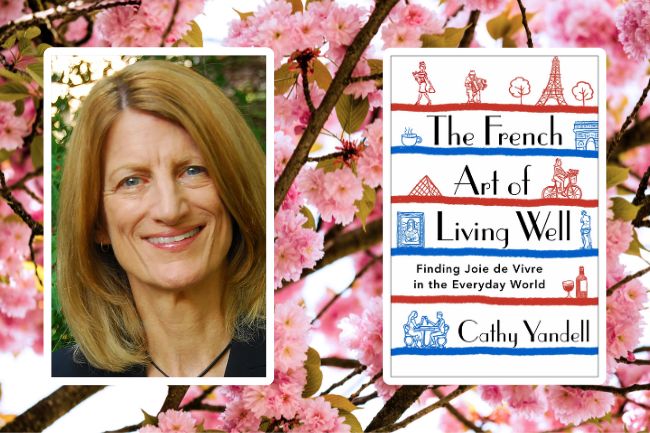Interview: Cathy Yandell, Author of The French Art of Living Well
Cathy Yandell is a professor at Carleton College in Minnesota, United States. She teaches courses in French Renaissance literature and culture, contemporary cultural and political issues in France, and the French language. She’s published articles on writers from Louise Labé to Montaigne, and has authored, edited, and coedited several books, including Carpe Corpus: Time and Gender in Early Modern France, Vieillir à la Renaissance, and Memory and Community in Sixteenth-Century France. In 2019, she was knighted by the French government into the Order of Academic Palms. When not buried in books, she loves dance, yoga, and flying trapeze. The French Art of Living Well is her first book for a general audience.
Janet Hulstrand: What made you want to write this book? Was there a particular lacuna in the vast numbers of books about France that you wanted to fill? Or was there a particular moment of inspiration that made you want to share the perspective, the information, and the stories that you share in this book?
Cathy Yandell: I’ve always been fascinated by the idea that the words joie de vivre are used in English because we can’t figure out a way to translate them fully – so I thought that it would be fun to try! The book is an exploration of many aspects of the French concept of “joy of living” – something that seems both refreshing and important as we emerge from the pandemic and beyond.
Janet: What drew you to France in the first place? And what has drawn you back again and again over the years?
Cathy: Even though I grew up with the sounds of Navajo, Hopi, Zuni, and Spanish all around me in New Mexico (and loved hearing the different languages), I was drawn to French when a Belgian singer came to town and stayed with our family. We sang “Frère Jacques” together, and I realized that it was a different song when she sang it – and the words were beautiful in her version. Later, I began to study the language and explore France’s culture… and I got hooked! I return regularly for fixes of all things French, but also for deep friendships.

The French will always find the time for “un p’tit café” © shutterstock
Janet: What do you love most about the way the French do things? (And what drives you the most crazy about them?)
Cathy: I love the French sense of time – even if their calendars are full, they still have time for a little conversation, “un petit café,” or a walk. There’s a privileging of human relations and of pleasure in daily life. And what drives me crazy? French administration: filling out paperwork, waiting in lines, dotting t’s and crossing i’s. (Really! Sometimes it’s absurd.)
Janet: Do you have a favourite area (or two) in France?
Cathy: I love Paris – its luminosity, its endless discoveries, and yes, even its inhabitants (OK, many of them!). Since I’ve been principally in Paris for the roughly 10 years that I’ve lived in France, my vision is limited, although I’ve also spent extended periods in Saint-Étienne, Pau, and Souillac. I’m inspired by the physical beauty of the Gorges du Tarn, the rocky coast in Brittany, the expansive vineyards near Bordeaux, the foothills of the Pyrénées, and the stunning mountain landscapes of Haute-Savoie. France has so many distinct cultures that I would like to explore more of them!

Cathy loves the mountains of Haute-Savoie © Shuttersock
Janet: How about a favourite activity? Maybe describe a perfect day in France for you.
Cathy: What a great question! There are many kinds of perfect days, but let’s say a vacation day in the city, one that doesn’t involve work or participating in serving at the soup kitchen that a friend of mine directs in the 19th arrondissement of Paris. My perfect vacation day in Paris would be much longer than 24 hours, for starters. I would begin the day with a run or walk around Luxembourg Gardens (or another outdoor location), followed by a breakfast with family or friends – a warm and crusty croissant with Bonne Maman jam, café au lait, and freshly squeezed orange juice. (I almost never have orange juice in the U.S., but fresh orange juice in France is divine – some markets even have orange-squeezing machines!) The day would continue with lots of walking, some combination of browsing in bookstores, strolling in the gardens of the Musée Rodin, along the Canal Saint Martin, the Canal de l’Ourcq, or the Seine. I love views from above, so the top of Notre-Dame (when it is restored), the Pompidou Center, Montparnasse Tower, or Montmartre would be a real treat. Then some copines (friends) and I would go to a hammam (Turkish baths), followed by a thé à la menthe (mint tea). Eventually, my true love and I would have an apéritif at an outdoor café and take in a film or a concert of classical or African music. Or maybe we would have a leisurely dinner with friends or dance in the Tino Rossi garden on the banks of the Seine.
My perfect day in the mountains, say Haute-Savoie, would be hiking all day almost nonstop, taking in the stunning views, and coming back to the auberge with raclette or cheese fondue for dinner, with everyone gathered around the fireplace drinking mulled wine, singing, and telling stories. (And all of this would include our two daughters if they could be in France on that day.) Thinking of a “favourite day” is a fantastic exercise – thank you!

Cathy’s perfect day would involve a walk along the Canal Saint Martin, in Paris © shutterstock
Janet: One of the things I love about your book is the way you highlight and appreciate the multicultural aspects of life in France. I find this interesting particularly because it seems to me that a lot of French people seem to be struggling to come to terms with multiculturalism. Do you have any thoughts about this (admittedly rather touchy) subject?
Cathy: You’re so right – the after-effects of immigration are a touchy subject in France, with many political dimensions. One of the points I try to make about a diverse society in the book is that the personal can become political: relationships between friends and neighbours from different cultural backgrounds can spill over into larger realms. My experiences in France would be greatly impoverished if my only friends were of “pure” French origin. When the slam artist Grand Corps Malade grew up as a European-origin French boy in a banlieue (suburb) populated by immigrants, he formed friendships for life. His songs and videos present a model of intercultural dialogue and hint that it might be possible in the future for us to gain a greater understanding and acceptance of difference.
Janet: I also love the broad reach of your recommendations for ways to better appreciate the French – from Baudelaire and Montaigne to contemporary rap artists and novelists, French TV, and bandes dessinées (comic books). Who are a couple of your favourite contemporary French writers? What about musicians?
Cathy: I have a long list of favourite authors, but to be brief: I appreciate the richness of Laurent Gaudé’s language and imagination, the experimentations of Leïla Slimani, and the humour and cultural critique of Roukiata Ouedraogo (originally from Burkina Faso). Annie Ernaux, who recently won the Nobel Prize in Literature, has a pared-down style that is not for everyone, but she treats difficult subjects with authenticity and sensitivity. For current popular music in French (not counting classical, jazz, or African music), I love Iseult’s haunting song “Corps” (Body) and many songs by Gaël Faye, Soprano, Gims, Stromae, and Angèle. Often, I like what is danceable, from rap to hip hop to pop. And I look forward to future discoveries!
The French Art of Living Well is published on May 23 2023 by Macmillan
Lead photo credit : The French Art of Living Well is published on May 23 2023 by Macmillan
Share to: Facebook Twitter LinkedIn Email
More in author interview, books about France, French life, French lifestyle, interview, Q&A
Leave a reply
Your email address will not be published. Required fields are marked *






REPLY
REPLY
REPLY
REPLY